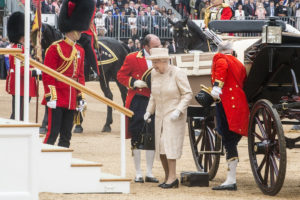
Queen Elizabeth II arrives at her Trooping the Colour parade on June 13, 2015 in London, England. Dempsey was invited to the ceremony as a representative for the US military by his British counterpart General Sir Nick Houghton. DOD photo by D. Myles Cullen/Released)
In SpectatorWorld, Ben Domenech explains why the rage of radical “journalists” toward Queen Elizabeth II is misplaced. Domenech suggests that the raging anti-colonialists fail to understand the Queen’s role as manager of decolonization reconciliation. He writes:
Huffington Post opinion editor Stephen Crockett Jr. posted, “The way I wish newspapers would write: ‘Colonizers lost one of their most beloved foot soldiers as Queen Elizabeth II, 96, mostly known for fuckshit and racism.’”
Atlantic writer and failed ESPN host Jemele Hill wrote, “Journalists are tasked with putting legacies into full context, so it is entirely appropriate to examine the queen and her role in the devastating impact of continued colonialism.”
And Harvard professor Maya Jasanoff wrote of the Queen in the New York Times, “We should not romanticize her era” because she put a “stolid traditionalist front over decades of violent upheaval” and her image served to “obscure a bloody history of decolonization.” And perhaps most damning of all: “She was, of course, a white face on all the coins, notes and stamps circulated in a rapidly diversifying nation.”
Of course, a more historically accurate depiction of the Queen’s tenure was that she oversaw a decolonization process that played out around the world, and did so with a great sense of responsibility and duty. In fact, it is no exaggeration to say that Queen Elizabeth’s presence was a key part of making decolonization possible, creating a great sense of fellow feeling for an international community of Britons distressed at what the new reality could bring.
If there were one mission, one duty that stood foremost in the Queen’s mind during her long reign, it was the positive transition from Empire to Commonwealth — with a consistent emphasis on preserving the best of a common culture while discarding obsolete notions of the past. The rage-filled partisans of the radical anti-Western left will bristle, but those nations emerging from the British colonial experience have generally found themselves more stable, more committed to human rights, and more dedicated to the rule of law than others.
This is in no small part due to the Queen’s insistence on “keeping the family together” under a new vision of the cooperation of equals. No other former colonial power even attempted such a commitment to its former colonies and their peoples.
There was no small amount of snickering comments during these years about the Queen’s colorful costumes and decidedly un-British ceremonies. She was, however, never deterred by the criticism. Her mission was abidingly clear: a respect for the good found in other cultures and traditions, along with the respect for the true and good found in the past. Both must be honored if the Commonwealth is to have meaning.
As Mary Harrington writes at Unherd:
In her single person, and in her dedication to a selfless life of public service, our late Queen embodied continuity across nearly a century of seismic change. She sailed serenely through the dismantling of the British Empire, accepting without demur its transmutation to a “Commonwealth” and her role as figurehead of that entity.
In this way, more than any other single individual, she both guided and personified Britain’s transition from the most sprawling empire in history to…whatever it is we are now. In her calm and stalwart presence, Great Britain managed to act as though nothing had really changed, or if it had it was all for the best. We could ignore the fading carpets, and the Russian oligarchs buying up grand country estates. We could ignore the ugly buildings where beautiful ones used to stand. We could ignore our apparent inability to build new infrastructure, or to agree over whether or how to defend our borders, or what our history means…
It was Victoria and Albert who first embraced monarchy as a form of moral leadership, pioneering the sober stoicism we’ve come to associate with our Queen. But it has been Elizabeth who most fully embraced that duty, and led by example – as at Prince Philip’s funeral. In her reign, this symbolic monarchy has taken on ever more intense meaning: for if Victoria still wielded a measure of direct power, as Empress of an immense territory, so the Queen’s moral leadership seemed to become more important, and weighty, as that territory evaporated.
What the ignorant leftists fail to understand is that a figure of such stability was essential to a historically unstable process.
If you’re willing to fight for Main Street America, click here to sign up for the Richardcyoung.com free weekly email.




